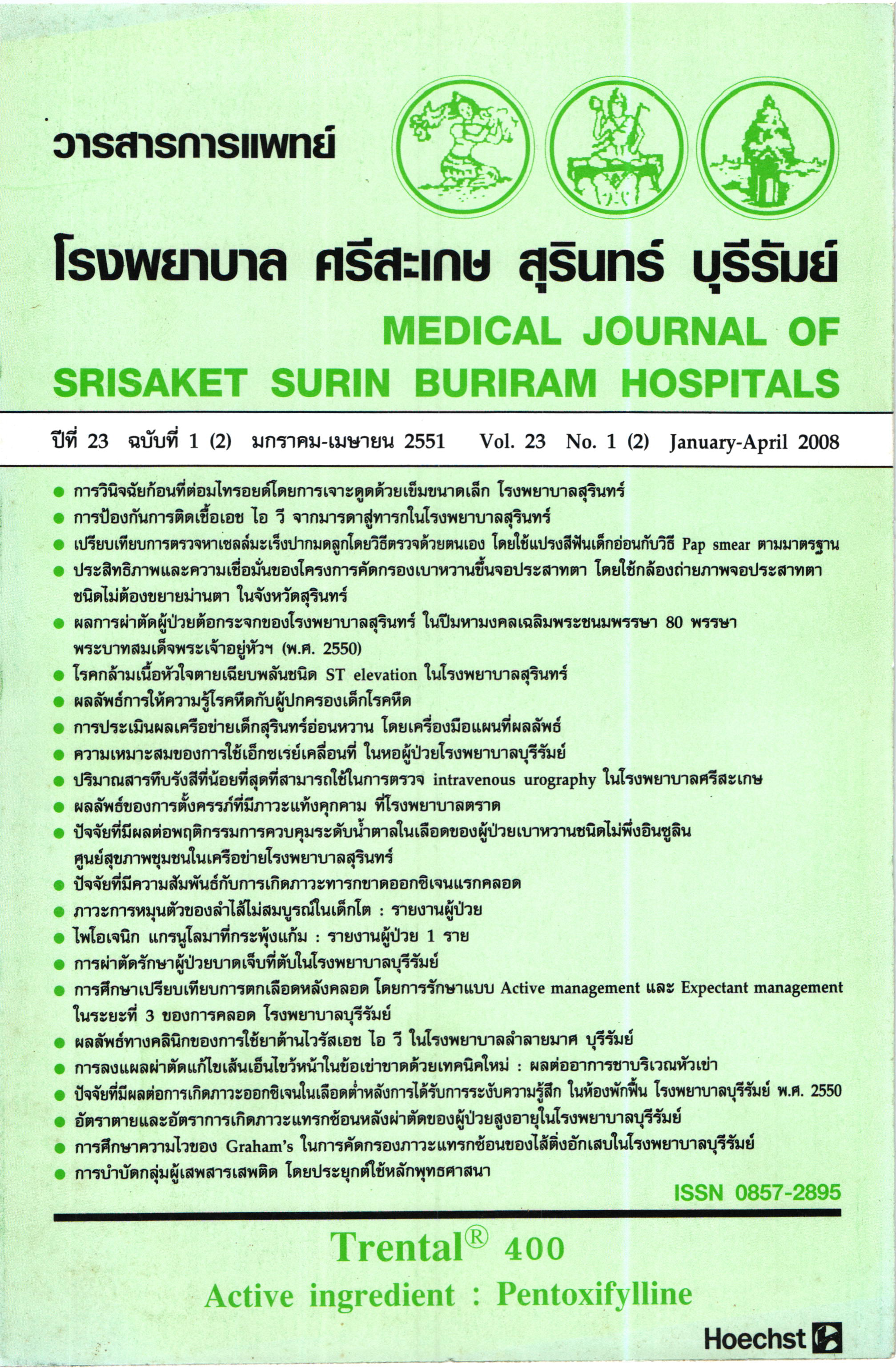ผลลัพธ์การให้ความรู้โรคหืดกับผู้ปกครองเด็กโรคหืด
Main Article Content
บทคัดย่อ
เหตุผลการวิจัย: แนวโน้มของโรคหืดในเด็กพบอุบัติการณ์สูงขึ้นทั่วโลก ผู้ปกครองเด็กถือว่าเป็น บุคคลสำคัญ (key persons) ในการดูแลเด็กโรคหืดให้เกิดประสิทธิภาพและ ประสิทธิผลสูงสุดโดยขึ้นอยู่กับความรู้ความเข้าใจของผู้ปกครองเกี่ยวกับโรคหืด
วัตถุประสงค์: เพื่อประเมินความรู้ของผู้ปกครองเด็กโรคหืดก่อนและหลังการให้ความรู้เรื่อง โรคหืดแก่ผู้ปกครอง
วัสดุและวิธีการ: ช่วงเดือนมกราคม-ธันวาคม พ.ศ. 2549 ผู้ปกครองเด็กโรคหืดอายุ 1-15 ปี ที่เข้ารับการรักษาที่คลินิกโรคหืดเด็กกลุ่มงานกุมารเวชกรรม โรงพยาบาลบุรีรัมย์ได้ทำแบบทดสอบเกี่ยวกับโรคหืด ก่อนที่จะให้ความรู้และอภิปรายซักถามทุกประเด็น เกี่ยวกับโรคหืดในเด็ก หลังจากนั้น 6 เดือน ผู้ปกครองจะได้ทำแบบสอบถามชุด เดิมอีกครั้ง เพื่อหาปัจจัยที่มิความสัมพันธ์กับความรู้เพียงพอของผู้ปกครองใน การดูแลโรคหืดในเด็ก
ผลการศึกษา: ผู้ปกครองเด็กโรคหืดทั้งหมด 120 ราย พบว่า 58 ราย (ร้อยละ 48.3) มีความรู้ โรคหืดเพียงพอในการดูแลเด็กโรคหืด (คะแนนมากกว่า 15 ใน 20 ข้อ) คะแนน เฉลี่ยของการทดสอบครั้งแรก 9.0 ± 3.6 คะแนน (5-20) และพบว่าระยะเวลา ยาวนานในการดูแลเด็กโรคหืดมีส่วนสัมพันธ์กับความรู้ความเข้าใจของผู้ปกครอง ในเด็กหลังจากการให้ความรู้และอภิปรายเกี่ยวกับโรคหืด คะแนนทดสอบครั้งที่ สองมีคะแนนมากขึ้นอย่างมีนัยสำคัญ (16.0 ± 2.6 ; P < 0.05)
สรุป: มากกว่าร้อยละ 50 ของผู้ปกครองเด็กโรคหืดยังขาดความรู้ความเข้าใจที่เพียงพอ ในการดูแลเด็กโรคหืด การวางแผนและวิธีการให้ความรู้เกี่ยวกับโรคหืดในเด็กแก่ ผู้ปกครองเป็นสิ่งจำเป็นในการดูแลรักษาเด็กโรคหืดให้เกิดประสิทธิภาพสูงสุด
คำสำคัญ: โรคหืด, เด็ก, ผู้ปกครอง, ความรู้
Article Details
เอกสารอ้างอิง
2. Junifer EF.Guyatt GH,Feeny DH. Measuring quality of life in the parents of the childrenwith asthma.Qual Life Res. 1996;5:27-34
3. Vichyanond P, Jirapongsananuruk O, Visitsuntorn N, Tuchinda M. Prevalence of asthma, rhinitis and eczema in children from the Bangkok area usingthe ISAAC (International Study for Asthma and Allergy in Children) questionnaires. J Med AssocThai 1998;81:175-84.
4. Godard P, Chanez P, Siraudin L, Nicoloyanis N, Duru G. Costs of asthma are correlated with severity : a 1 - yr prospective study. Eur Respir J 2001;19:61-67
5. Marianna S, Stuart A, Edward B, Chantal A, Susan P, Christine K, et al. Delivering Tailored Asthma Family Education in a Pediatric Emergency Department Setting : A Pilot Study. Pediatrics 2006;117(4);S135-S144
6. Henry RL, Cooper DM, Halliday JA. Parentalasthma knowledge: its association with readmission of children to hospital. J Paediatr Child Healthl995;31:95-8.
7. Asher MI, Grant C. Epidemiology of asthma. In : Chernick V, Boat TF, Wilmott RW, Bush A, editors. Kendig's disorders of the respiratory tract in children. 7th ed. Philadelphia: Elsevier; 2006:762-85.
8. Goeman DP, Aroni RA, Stewart K, Sawyer SM, Thien FC, Abramson MJ, et al. Patients' views of the burden of asthma : a qualitative study. Med JAust 2002;177:295-9.
9. Peterson-Sweeney K, McMullen A, Yoos HL, Kitzman H. Parental perceptions of their child'sasthma: management and medication use. J PediatrHealth Care 2003;17:118-25.
10. Brook U, Mendelberg A, Heim M. Increasing parental knowledge of asthma decreases the hospitalization of the child : a pilot study. J Asthma 1993;30:45-9.
11. Fadzil A, Norzila MZ. Parental asthma knowledge. Med J Malaysia 2002;57:474-81.
12. Hazir T, Das C, Piracha F, Waheed B, Azam M. Carers' perception of childhood asthma and its management in a selected Pakistani community. Arch Dis Child 2002;87:287-90.
13. Donnelly JE, Donnelly WJ, Thong YH. Inadequateparental understanding of asthma medications. Ann Allergy 1989;62:337-41.
14. Simasatien T. Knowledge of asthma among parents of asthmatic children. R Thai Air Force Med Gaz 1996;42:34-48.
15. Grant EN, Turner-Roan K, Daugherty SR, Li T, Eckenfels E, Baier C, et al. Development of a survey of asthma knowledge, attitudes, and perceptions : the Chicago Community Asthma Survey. Chicago Asthma Surveillance Initiative ProjectTeam. Chest 1999;116 (4 Suppl1):178S-83S.


